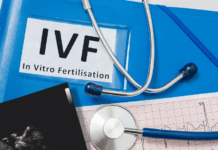This week has been emotional for me, to say the least.  I’m preparing for my son’s 1st birthday. I’ve gathered newborn photos, compiled mementos, written about his milestones, and done a fair share of crying through it all! He’s my second child, as well as my final one, and I have been coming to terms with this being the last 1st birthday I’ll get to throw.
I’m preparing for my son’s 1st birthday. I’ve gathered newborn photos, compiled mementos, written about his milestones, and done a fair share of crying through it all! He’s my second child, as well as my final one, and I have been coming to terms with this being the last 1st birthday I’ll get to throw.
These emotions were expected. All big moments in motherhood are bittersweet! But what I didn’t expect was how another upcoming event would inspire deep reflections on motherhood.
Saturday, October 12th — the same day we will celebrate my son’s first year — is World Arthritis Day. I am one of the 1.3 million Americans who suffer from rheumatoid arthritis.
“But you’re so young!” people exclaim upon hearing this fact. It’s common to think of arthritis as an older person’s ailment, yet there are over 100 joint and chronic pain disorders that fall under its umbrella. I have one of the most common types, rheumatoid arthritis, which is an incurable autoimmune disorder where the body attacks healthy joint tissue. This results in chronic pain, stiffness, joint degeneration, deformity, and often long-term disability. While it can affect people of any age — even as early as infancy — it’s most commonly seen in women, with an average onset age of 40-60 years old.
I received my diagnosis 13 years ago during my final semester in college, well before I even considered having children. And despite having been a mother for three of those years, it’s only recently I’ve regarded its impact on my motherhood experience.
From the moment my husband and I decided to start a family, I had to consider how this disease and its therapy would impact my body — from planning; to conception; to pregnancy; to delivery and postpartum recovery. The medicine I had taken since my diagnosis is unsafe for pregnancy, so I had to change to a new medication before we planned to conceive. For me, this meant my eight-year regimen of taking pills suddenly turned into learning how to self-administer injections. It also meant having to find resources to help cover the cost of this more expensive medication. I’ve been fortunate to have health insurance coverage through these times, but I’ve also enrolled in patient assistance programs to offset my monthly expenses.
After becoming pregnant, it was imperative to have both my rheumatology and OB teams fully involved. With each of my pregnancies, after consulting my doctors, I stopped my Humira injections during the first trimester. I hoped I would be one of the lucky women who go into remission while pregnant; unfortunately, both times I restarted my injections in the second trimester due to worsening joint pain and stiffness.
Thanks to careful monitoring from my medical team, both of my pregnancies went without complication. My babies arrived strong and healthy, with relatively smooth deliveries. I was proud. I did it! There had been setbacks and challenges, but I felt quite fortunate.
However, though I won’t go through pregnancy with RA again, I still have to endure its impact on my everyday life: specifically, how it affects my ability to be a hands-on mother.
Just last month, during my routine bi-annual rheumatologist visit, I complained of some ongoing pain and joint-slipping in my knees. The doctor ordered x-rays and discovered not one, but two new types of arthritis in my body: osteoarthritis and calcium pyrophosphate dihydrate crystal deposition disease (CPPD for short).
Needless to say, that was discouraging news. In addition to increasing my injection frequency, I will need physical therapy and anti-inflammatory medications to prevent further joint deterioration. Understandably, these new diagnoses have had me thinking: How will I keep up with my children? Can I be active in their lives the way I want to be? Will they resent me if I can’t?
I can’t worry about what will be; I can only focus on the here and now. And this week, as I make decorations, whip up snacks and finger foods, and clean my house in preparation for hosting our guests, I’ll sink into these moments — this last 1st birthday party I get to throw — and let the love for my family move me forward. Even if my own body struggles to do so.


















Thanks for sharing your story and shedding light on what can be an invisible condition. Illness and chronic conditions know no boundaries of age or appearance. It sounds like you are doing a great job prepping your party and I hope you enjoy the celebration of your little one’s 1st and of your motherhood! Much love.